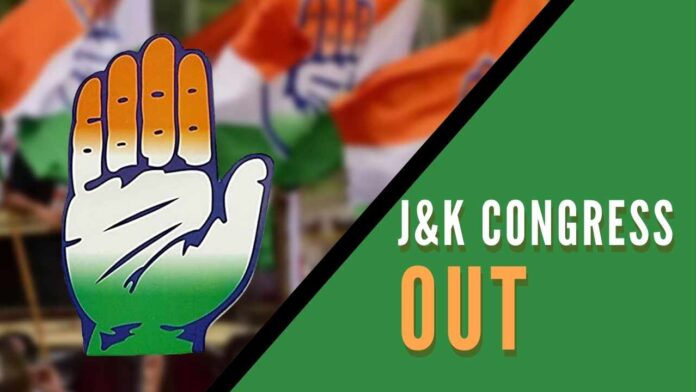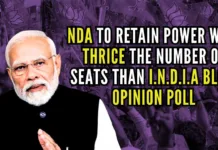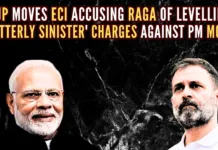
Will Jammu and Kashmir Congress survive?
Believe it or not, it’s a fact that UK-founded Congress opened its branch in J&K only in 1965. It happened during the epoch-making period of Lal Bahadur Shastri, which also witnessed the end of the offices of Sadar-e-Riyasat and Wazir-e-Azam and the establishment of the offices of Governor and Chief Minister in J&K. That year, almost the entire pro-autonomy National Conference (NC) merged with Congress. Congress ruled the state between 1965 and February 1975 on its own strength and the Congress chief ministers during this period were GM Sadiq and Syed Mir Qasim, both from Kashmir.
In 1974, Congress dumbfounded the nation, nay the international community, by initiating talks with the deflated and marginalized former NC president and J&K Wazir-e-Azam and Plebiscite Front chief Sheikh Abdullah. The talks culminated in what is known as the Indira Gandhi-Sheikh Abdullah Accord of 1975. Under the Accord, the then PM Indira Gandhi brought down her own party’s government led by Mir Qasim and Sheikh Abdullah, whose Front didn’t have even a single MLA or MLC in the Legislature, was installed as J&K CM in February the same year. The Sheikh dissolved the Plebiscite Front and revived NC. The government that the Sheikh headed was a coalition government with Congress as its partner. More importantly, the mind-boggling accord also empowered the Sheikh to review all the Central laws applied to J&K after August 9, 1953, when Sheikh Abdullah was dethroned and arrested under the sedition charges and for hobnobbing with the United States with a view to establishing a “Switzerland-type independent Kashmir”.
The 1975 Accord became a story of the past within a short span of two years. Indira Gandhi withdrew the Congress support to the Sheikh-led government and the government collapsed. The clash of interests or the ego clash between Indira Gandhi and Sheikh Abdullah resulted in fresh Assembly elections in J&K. These bitterly contested elections were fought on purely emotive and divisive issues. Sheikh Abdullah won the elections hands down in Kashmir and parts of Jammu province adjoining Kashmir. Indira’s Congress, which contested the elections essentially on nationalistic and Jammu planks, won hands down most of the seats in Jammu province. The BJP didn’t exist then. Its earlier incarnation, Bharatiya Jana Sangh, had merged itself with Janata Party. Janata Party did contest the election in J&K but had to bite the dust in almost all the constituencies.
The re-emergence of NC and the kind of politics it played after 1977 weakened Congress. It remained out of power between 1977 and 1987. In 1987, the then PM Rajiv Gandhi entered into a disastrous accord with Sheikh Abdullah’s son, Farooq Abdullah, called Rajiv-Farooq Accord. The NC-Congress accord, which culminated in the wholesale rigging of the Assembly elections in Kashmir and put many Kashmiri Muslims on the road to secessionism, did bring NC and Congress to power, but it was short-lived for obvious reasons. One of the reasons was the rise of violence and anti-India movement across Kashmir. The situation was so volatile that Farooq Abdullah fled away to London on January 19, 1990, to save his life as the terrorists were on a killing spree. The result was that the terrorist and secessionist-infested state remained under Governor/ President rule between January 19, 1990, and October 9, 1996.
Paradoxically, the 1996 Assembly elections gave a massive mandate to the same Farooq Abdullah. He won 57 seats and formed a government on his own strength on October 9. Congress remained out of power till November 2002. In 2002, Kashmir, for the first time, gave a fractured verdict. The NC won only 28 seats across J&K under the leadership of Farooq Abdullah’s son, greenhorn Omar Abdullah. The newly-founded People’s Democratic Party (PDP) of Mufti Sayeed and Mehbooba Mufti won 15 seats, all from Kashmir. The remaining seats were shared between Congress, BJP, Panthers Party, CPIM, etc. NC refused to stake the claim to the CM chair. The NC’s refusal provided an opportunity for Congress to again enjoy some loaves and fishes of office in J&K as the fractured verdict resulted in an accord between Congress, PDP, JKNPP, and CPIM with Mufti Sayeed from Kashmir becoming J&K CM for the first three years and Congress, which had won 20 seats, and other parties, barring NC, becoming junior partners in the government. Under the accord, the Mufti was to lead the government till November 2, 2005.
On November 2, 2005, ethnic Kashmiri Ghulam Nabi Azad replaced Mufti Sayeed and became the third and the last Congress CM in J&K. However, Azad not only had to keep the hostile PDP in good humour to save his government but also to face pressure from below in Jammu province. Congress failed on both fronts. PDP withdrew its support to the Azad-led government on June 28, 2008, over the Amarnath land issue, notwithstanding the fact that Azad pursued the PDP line violating the High Court’s directions, and the people of Jammu province also launched a massive movement on the same issue on the same date. The Jammu agitation, which paralyzed everything in Jammu province for over two months, led to the resignation of Azad from the post of CM on July 7. The Assembly was dissolved. The result was that J&K had to be brought under the Governor’s rule.
The 2008 Assembly elections also produced a fractured verdict. NC under the leadership of Omar Abdullah again won 28 seats, Congress 17, and the remaining seats were shared between other parties, including BJP, CPIM, and Kashmir-based People’s Democratic Front (PDF). This time, however, NC decided to capture power. Congress, which was unhappy with PDP, decided to enter into a post-poll alliance with NC. Omar Abdullah became CM for a full term of six years and Congress had to remain contented with the position of a junior partner in the government. Omar Abdullah completed a full term in 2014. And ever since, Congress has been declining.
In 2014, Congress could win only 12 Assembly seats – five from Jammu, four from Kashmir, and three from Ladakh, which became UT on August 5-6, 2019. Significantly, all its candidates lost the election in all the Hindu-majority constituencies in Jammu province with BJP creating a history of sorts by winning for the first time 25 seats. Earlier in 2014, Congress contested the general elections in alliance with NC and lost both LS seats in Jammu. Even Azad suffered a humiliating defeat. It met the same fate in the 2019 general elections. On both occasions, BJP won these seat hands down. The Congress had become unpopular across Jammu province because of its appeasement policy and hostile and negative attitude to the Hindus.
However, it was on August 26, 2022, that Congress witnessed a massive political upheaval. That day, Azad, who served in Congress for 50 years, severed all his ties with Congress and resolved to establish his own national-level party with its very first branch to be established in J&K. Since then, almost all those who mattered in the J&K Congress have been quitting Congress on a daily basis, saying “it is a sinking ship”, and joining the Azad camp in large numbers. Almost all the former Congress ministers and legislators both from Kashmir and Jammu have already left the Congress and joined Azad, who will address a rally at the Sanik Farms in Jammu on September 4. There are cogent reasons to believe that many more from Congress and other Kashmiri parties would join Azad on and after September 4 and further weaken the already weak and almost leaderless official Congress.
Will Congress, which no non-Muslim ever headed in J&K, survive? Can it withstand the upheaval caused by Azad? The general view is: It will not and that it’s out. As for the impact of the Azad revolt on J&K politics, there is general consensus that Azad’s party may or may not win seats but it will surely mar the poll prospects of NC, PDP, JK Apni Party – apart from Congress itself – in Kashmir province in general and Jammu province in particular”.
Note:
1. Text in Blue points to additional data on the topic.
2. The views expressed here are those of the author and do not necessarily represent or reflect the views of PGurus.
PGurus is now on Telegram. Click here to join our channel and stay updated with all the latest news and views
For all the latest updates, download PGurus App.
- ‘Kashmir My core constituency’: Revisiting July 12, 2003 to understand politics, Omar Abdullah-style - March 15, 2024
- Total deviation from traditional approach: Seven takeaways from PM Modi’s March 7 Srinagar visit - March 9, 2024
- Status of political parties: Why is further J&K reorganization imperative? - March 1, 2024










